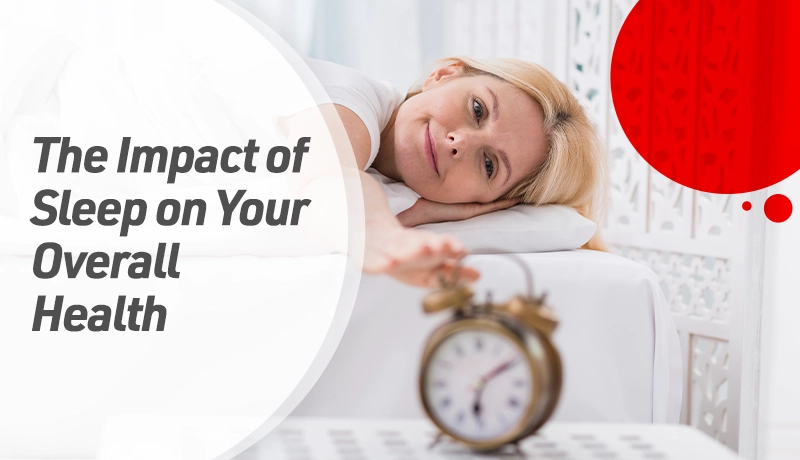Introduction
Sleep is one of the most fundamental aspects of maintaining good health, yet it’s often overlooked in today’s fast-paced world. The quality and quantity of sleep we get directly impact both our physical and mental well-being. From boosting our immune system to sharpening cognitive functions, sleep is a cornerstone of overall health. In this article, we’ll explore the profound impact of sleep on the body and mind, as well as provide actionable tips for improving sleep hygiene to promote better rest.
Table of Contents
Why Is Sleep So Important?
Sleep allows the body and mind to recover and recharge. During sleep, the body undergoes essential restorative processes, such as muscle repair, hormone regulation, and memory consolidation. Without enough quality sleep, these vital functions are disrupted, leading to a wide range of health issues.
A healthy sleep cycle also supports the immune system, helps regulate metabolism, and plays a significant role in mood regulation. In short, sleep is the body’s way of healing, recharging, and preparing for the challenges of the day ahead.
The Different Stages of Sleep

Sleep consists of several stages, each with its own unique benefits. These stages can be divided into two main categories: non-rapid eye movement (NREM) sleep and rapid eye movement (REM) sleep.
NREM Sleep
NREM sleep is composed of three stages:
- Stage 1: This is the transition between wakefulness and sleep. It’s a light sleep stage, where you can easily be awakened.
- Stage 2: Your body starts to relax further, with slower heart rate and a drop in body temperature. This stage prepares you for deep sleep.
- Stage 3: Also known as deep sleep, this stage is the most restorative. Your body repairs tissues, strengthens the immune system, and supports growth and development.
REM Sleep
REM sleep is the stage where most dreaming occurs. It plays a critical role in memory consolidation and emotional regulation. During REM sleep, brain activity is high, but the body is essentially immobilized to prevent acting out dreams.
Both NREM and REM sleep are essential, and cycling through these stages multiple times each night ensures that the body and mind are fully rested and rejuvenated.
How Sleep Affects Physical Health
Immune System Function
Quality sleep strengthens the immune system. During sleep, your body produces cytokines—proteins that fight infections and inflammation. Without enough sleep, your immune system becomes weakened, making you more susceptible to illness. This is why people who consistently get inadequate sleep are more likely to catch colds or develop other health conditions.
Weight Management and Metabolism
Sleep plays a crucial role in regulating metabolism and appetite. When you’re sleep-deprived, your body produces more ghrelin (the hunger hormone) and less leptin (the hormone that tells you when you’re full), leading to increased cravings and overeating. Chronic sleep deprivation is linked to weight gain and obesity due to this imbalance in hunger-regulating hormones.
Moreover, lack of sleep can affect insulin sensitivity, increasing the risk of type 2 diabetes. Ensuring sufficient sleep helps regulate these metabolic processes and supports healthier eating habits and weight management.
Heart Health
Consistent poor sleep has been associated with an increased risk of heart disease, high blood pressure, and stroke. Sleep helps the heart repair and reduce inflammation, which is critical for long-term cardiovascular health. People who suffer from sleep disorders, such as sleep apnea, are at higher risk of developing cardiovascular problems because their sleep cycles are frequently interrupted, preventing the body from undergoing its necessary restorative processes.
Physical Performance and Recovery
For athletes or anyone engaging in regular physical activity, sleep is essential for performance and recovery. During deep sleep, muscle tissues repair, and the body restores energy levels, preparing you for the next day’s activities. Sleep also helps with motor skill development and coordination, making it a crucial factor in both professional and recreational athletic performance.
The Impact of Sleep on Mental Health

Cognitive Function and Memory
Sleep is crucial for cognitive function. It enhances memory consolidation, allowing you to process and store information learned throughout the day. When you sleep, the brain organizes and solidifies these memories, helping you retain new information and recall it when needed. Lack of sleep disrupts this process, leading to forgetfulness, difficulty concentrating, and impaired problem-solving skills.
Mood Regulation and Emotional Well-being
Sleep and mood are deeply interconnected. Sleep deprivation makes it harder to regulate emotions, leading to irritability, mood swings, and increased stress. Chronic sleep deprivation has been linked to mental health issues such as anxiety and depression. In fact, individuals with insomnia are much more likely to develop anxiety disorders or depression due to the cumulative effects of poor sleep on emotional processing.
On the flip side, a good night’s sleep helps balance emotional responses, improves resilience to stress, and fosters a positive outlook.
Stress and Anxiety Reduction
When you’re sleep-deprived, your body produces more cortisol, the stress hormone, which can increase feelings of anxiety and tension. Over time, high cortisol levels contribute to chronic stress, which not only impacts mental well-being but also weakens the immune system and leads to other physical health problems. Adequate sleep helps lower cortisol levels, reducing stress and promoting mental clarity and calmness.
Consequences of Poor Sleep
Consistent poor sleep, whether due to insomnia, sleep apnea, or lifestyle factors, has far-reaching consequences for both physical and mental health. Short-term effects include difficulty concentrating, irritability, and impaired judgment. However, the long-term consequences can be more serious, contributing to chronic conditions such as hypertension, diabetes, depression, and cognitive decline.
Sleep deprivation can also lead to dangerous situations, such as drowsy driving, which is a major cause of road accidents.
Tips for Improving Sleep Hygiene

Improving sleep hygiene is the key to enhancing the quality and duration of your sleep. Here are some tips to help you establish better sleep habits:
1. Establish a Consistent Sleep Schedule
Going to bed and waking up at the same time every day, even on weekends, helps regulate your body’s internal clock. Consistency reinforces your sleep-wake cycle, making it easier to fall asleep and wake up naturally.
2. Create a Relaxing Bedtime Routine
Engage in relaxing activities before bed to signal to your body that it’s time to wind down. This could include reading, taking a warm bath, practicing deep breathing, or meditating. Avoid stimulating activities like watching TV or using electronic devices, as the blue light emitted from screens can interfere with melatonin production, making it harder to fall asleep.
3. Optimize Your Sleep Environment
Your bedroom should be a sanctuary for sleep. Ensure that it is cool, dark, and quiet, as these conditions promote better sleep. Consider using blackout curtains, earplugs, or a white noise machine if necessary. A comfortable mattress and pillows are also essential for supporting restful sleep.
4. Limit Caffeine and Heavy Meals Before Bed
Caffeine can stay in your system for hours, so it’s best to avoid it in the late afternoon and evening. Heavy meals close to bedtime can also cause discomfort or indigestion, which may interfere with your ability to fall asleep. Instead, opt for a light snack if you’re hungry before bed.
5. Be Mindful of Naps
While naps can be beneficial for making up lost sleep, taking long or irregular naps during the day can interfere with nighttime sleep. If you need to nap, try to keep it short (20-30 minutes) and early in the afternoon.
6. Get Regular Physical Activity
Regular exercise is one of the best ways to improve sleep quality. Physical activity helps tire out your body, making it easier to fall asleep at night. However, avoid vigorous exercise too close to bedtime, as it may have the opposite effect and keep you awake.
7. Manage Stress and Anxiety
Stress and anxiety are common causes of sleep disturbances. To manage these issues, practice relaxation techniques such as deep breathing, meditation, or journaling. Managing stress during the day will make it easier to sleep soundly at night.
Frequently Asked Questions
- How many hours of sleep should I get each night? Most adults need 7-9 hours of sleep per night for optimal health.
- Can naps make up for a poor night’s sleep? Short naps can help you feel refreshed, but they’re not a substitute for regular, quality nighttime sleep.
- What is sleep hygiene? Sleep hygiene refers to the habits and practices that promote good sleep quality, such as maintaining a consistent bedtime, creating a relaxing sleep environment, and limiting screen time before bed.
- Why do I wake up in the middle of the night? Waking up during the night can be caused by stress, anxiety, inconsistent sleep schedules, or medical conditions like sleep apnea.
- How can I improve my sleep quality? Improve sleep quality by establishing a regular bedtime, creating a comfortable sleep environment, limiting caffeine, and engaging in relaxation techniques before bed.
Conclusion
Sleep is a vital pillar of health, affecting everything from physical performance and immune function to mental clarity and emotional resilience. Prioritizing sleep is essential for both immediate well-being and long-term health. By following good sleep hygiene practices, you can improve the quality of your sleep, leading to a healthier, more balanced life.










